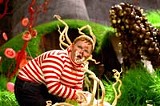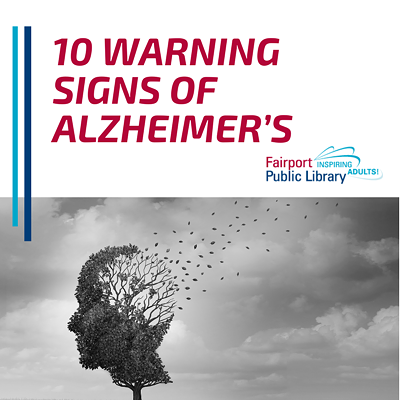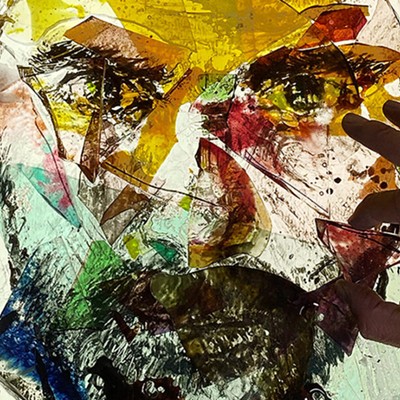[
{
"name": "500x250 Ad",
"insertPoint": "5",
"component": "15667920",
"parentWrapperClass": "",
"requiredCountToDisplay": "1"
}
]
The 1971 adaptation of Roald Dahl's Charlie and the Chocolate Factory, retitled Willy Wonka and the Chocolate Factory, attained the status of a children's classic, approaching works like Pinocchio, Snow White, and The Wizard of Oz. Because of its success with a generation of filmgoers and in keeping with contemporary cinematic practice, a remake must have seemed almost obligatory.
In order to match or even surpass the original, the new version employs the kind of film technology unavailable to the makers of the earlier picture, and pairs the considerable talents of Tim Burton and Johnny Depp, who have worked together most successfully in the past in such quirky pictures as Edward Scissorhands and Sleepy Hollow.
The combination of that artistry and cinematic wizardry, along with the Burton's (and Depp's) penchant for the bizarre should result in a dazzling film, a classic remake of a previous classic. The result of the collaboration, however, proves less than compelling, a dull, drab picture, not so much a remake as a smudged carbon copy (remember those?) of a bright, clear original. The whole production in fact seems dark and smeary in both form and content, an unsatisfying mess that seldom matches the quality of either Dahl's book or the values of the original.
Aided by a juicy voiceover narration, the picture establishes the initial fairy tale situation of the poor but deserving young boy, Charlie Bucket (Freddie Highmore), who dwells in a squalid hovel so cramped that all four of his grandparents share a bed. The factory of the title, owned by the secretive Willy Wonka (Depp), dominates the town and the dreams of all its inhabitants, including Charlie. Willy announces that he will place five golden tickets randomly in his Wonka bars, which will admit the lucky finders to his wonderful factory so they can discover and enjoy all its sweet delights.
In the manner of such stories, after encountering a number of seemingly impossible difficulties --- his family can only afford one chocolate bar a year, on his birthday --- Charlie finds a ticket and joins the fortunate few. As in the previous film, Charlie and his obnoxious fellow winners meet the mysterious Willy Wonka and observe his confectionary paradise, with a chocolate waterfall and river, candies growing on trees, grass made of sugar, squirrels shelling nuts, and a large crew of miniature workers called Oompa-Loompas who mine and package the product.
The picture provides a whimsical back-story that explains the character and behavior of the eccentric Willy Wonka, who tends to become physically ill at the mention of parents or family. Not surprisingly, the candy manufacturer's estranged father (Christopher Lee), with whom he finally reconciles, is a dentist, underlining the movie's minor thematic conflict of healthy versus unhealthy teeth (Charlie's father was fired from his job at the toothpaste factory). The example of the saintly Charlie's sacrifice for his family ultimately inspires Willy to change his life.
All that pious baloney aside, the movie simply fails to capitalize on the delightful possibilities of its ambiguous materials. It so strongly stresses the dark side of its story in both visual and thematic terms that it contrasts detrimentally with the bright, lively, whimsical appearance of its predecessor. Its generally lackluster color scheme appears to permeate many other areas, including the dull and unimaginative musical score and the strangely lethargic pace of its narrative.
Perhaps most damaging, the striking and memorable characters in the original diminish in Burton's interpretation. Just as the director fails to exploit the rich and colorful possibilities in the story, he even neglects the famous Oompa-Loompas, whose odd dance and music enlivened the first film; here the obvious and uninteresting digital projection transforms the troupe of little people into a most unconvincing duplication of a single figure.
Johnny Depp's disappointing interpretation of Willy Wonka probably wreaks the most damage on the movie. Despite his apparent denials, it is impossible not to see Michael Jackson as the inspiration for the part --- the extreme makeup, the weird hair, the bizarre costume, the jumpy gestures and movements, and of course the concept of another sort of Neverland, a paradise for little children over which this oddball presides, suggests the influence of one of the major freaks of our time.
His acting and the whole film should make any viewer more deeply appreciate the work of Gene Wilder and the success of the original.
Charlie and the Chocolate Factory (PG), directed by Tim Burton, is playing at Canandaigua Theatres, Culver Ridge Cinema, Eastview 13, Geneseo Theatres, Greece Ridge 12, Henrietta 18, Pittsford Cinema, Tinseltown.
Latest in Movie Reviews
More by George Grella
-

Film Review: "Cake"
Jan 26, 2015 -

Film Review: "American Sniper"
Jan 19, 2015 -

Film Review: "Inherent Vice"
Jan 12, 2015 - More »






